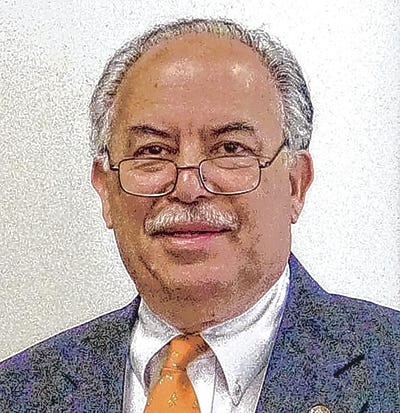
Whether schools are ready or not, artificial intelligence is working its way into classrooms. So, seven months ago, the Colorado Education Initiative set out to create a roadmap that would guide K-12 school districts through the implementation of the technology.
“School districts are really thinking about how AI is going to reshape teaching and learning,” said Patty Quinones, a senior partner at the Colorado Education Initiative. “Technology is moving so quickly that we felt that we needed to ask some questions that districts are thinking about and hopefully guide them to their solutions, and give them some basic understanding of AI and resources so that they can delve further into why you would want to use it.”
It’s ultimately up to school districts and school boards to create policy around artificial intelligence, but the nonprofit’s “Colorado Roadmap for AI in K-12 Education” — which was released in August — helps chart that path forward.
To craft the 28-page roadmap, the authors engaged a steering committee, advisory groups and five working groups. Over 100 educators, policymakers, industry leaders (in education and artificial intelligence), community members and students were involved in the process.
The Colorado Department of Education has yet to release any of its own policies or standards around artificial intelligence. However, it was engaged in every step and group, Quinones said. Susana Córdova, the state’s commissioner of education, cosigned the roadmap’s introduction with Rebecca Holmes, Colorado Education Initiative’s president and CEO.
In an email, Córdova stated that the department “encourages districts to use this tool to guide their choices. As artificial intelligence continues to evolve, it is crucial for districts to stay informed, and this roadmap serves as a vital resource to help them navigate the complexities of AI implementation.”
What Colorado AI roadmap recommends
While the future of artificial intelligence in education is exciting, the roadmap acknowledges the need for some guardrails as schools move forward, Quinones said.
The recommendations from the working groups are ultimately summarized in three main categories in the roadmap:
- Reshaping teaching and learning
- Advancing equitable access for all learners
- Developing policy for transparent and ethical use
In calling upon school districts as well as state leaders and organizations to continue learning and putting in policies for artificial intelligence, Quinones acknowledged that there should be a sense of urgency.
“We wanted to make sure that administrators and teachers understood that they are controlling what they bring into their classrooms, but we also felt it was imperative they understand they have to start now,” she said. “It’s all around us, it’s hitting every sector and we want teachers to be able to explore, to experiment and use the tools.”
For teachers, the roadmap advises that artificial intelligence can help with lesson planning, curriculum development, personalizing learning, enhancing instruction, grading, administrative tasks and more.
“AI is an incredible tool that holds the potential to enhance and complement people-centered teaching methods,” said Kevin Vick, educator of 20+ years and president of Colorado Education Association. “When integrated thoughtfully and ethically, AI can assist educators in many different avenues of instruction tailored to the diverse needs of students. However, it is essential that AI remains a tool in the hands of skilled educators, rather than a replacement for the human connection, empathy, and professional judgment that are at the heart of effective teaching.”
During the process of creating the roadmap, Quinones added that Colorado Education Initiative heard from students that “they feel like they need to have AI as part of their education.”
“They would like guidance from their teachers about being able to use it effectively,” she said. “The students are really very aware that when they go into the workforce, they’re going to have to know how to use AI.”
The roadmap advises that artificial intelligence can support students with personalized learning, critical thinking and skill development, language learning, accessibility and more.
Even with the positives, the roadmap does outline where artificial intelligence falls short — understanding cultural and emotional nuances, making complex decisions and more — as well as ethical challenges and considerations that will need to be made in policy discussions.
The roadmap outlines how school districts can create policies that protect student data, define acceptable use, test AI, avoid discrimination and harassment and more.
“We don’t want people to panic,” Quinones said. “We want them to do what they do and move things forward.”
And as school districts look ahead, the roadmap recommends that equity be a key part of their initiatives.
“We want AI to be not only a transformational technology but also to close the digital divide. We want equity to be at the forefront of using this technology for all students,” Quinones said.
Quinones added that this has to include addressing existing “digital divides” in terms of access to devices, internet and other technology so that all students can take advantage of artificial intelligence.
Foundationally, the roadmap suggests that bringing artificial intelligence into the classrooms needs to start with developing literacy around the technology.
“Every student, every teacher should be exposed to what AI is, how to use it effectively, the risks involved, and the challenges as they move forward. But we all need to have a basic understanding of what is AI,” Quinones said. “This roadmap will definitely help guide those conversations and help leaders talk to their school boards and communities about what they are doing around AI.”
What comes next for Colorado’s schools and AI?
Although the roadmap puts the impetus on school districts and state leaders to drive the next steps of bringing artificial intelligence into schools, the Colorado Education Initiative has its own plan to help this along.
The nonprofit received the Colorado Opportunity Now grant, which will allow it to help eight school districts act out the roadmap as a two-year pilot program. The eight school districts include Harrison, Mesa County Valley, Greeley, Brush, Estes Park, Adams 12, Cañon City and Julesburg.
“We’re going to learn a lot with this grant with these school districts who then we hope will be eight north stars of exemplary work around AI,” Quinones said.
In addition to the grant and pilot, Colorado Education Initiative will be creating webinars to present the webinar in a different fashion as well as partnering with the University of Colorado Boulder to create AI professional development for teachers.
Plus, as the technology continues to evolve, so will the roadmap and its resources, Quinones said.



